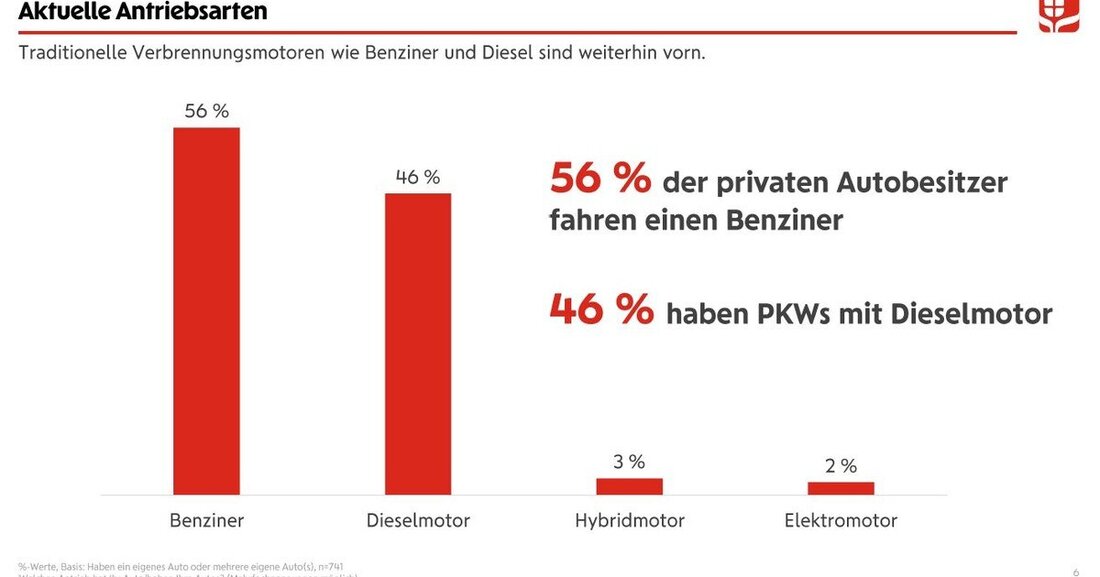Austrians have gasoline in their blood
A survey by Wiener Städtische shows that cars are important to Austrians, with petrol and diesel dominating.

Austrians have gasoline in their blood
Your own car is still the number one status object for Austrians. This is confirmed by a representative online survey of 1,000 Austrians by the Gallup Institute on behalf of Wiener Städtische. For two thirds of those surveyed, the car has a very high to high value. 74 percent of the driving license holders surveyed also have their own car.
"For many people, the car is very important in the balancing act between work, family and leisure time. Not surprisingly, the car plays a more central role, especially for the rural population, than in urban areas," eexplains Doris Wendler, CEO of Wiener Städtische Versicherung,the results of the survey.
The vast majority of people in Austria use traditional combustion engines such as gasoline (56 percent) or diesel (46 percent). Hybrid or electric cars are only used at 3 and 2 percent respectively. The fact that the total is more than 100 percent is explained by the possibility of multiple responses.
When asked whether they want to change their mobility behavior in the future, only 22 percent say that this is the case. 40 percent of those willing to make a change want to buy a new car. What's interesting is that people under 30 in particular don't want to buy an electric car, but two-thirds tend towards classic combustion engines. Alternative drive types such as hybrid or electric are preferred by the 51+ generation. This is probably mainly due to the relatively high prices of electric vehicles.
"The survey figures also reflect the current registration statistics for 2021, where traditional fuel types such as petrol and diesel also make up almost 80 percent. Alternative drive types are on the rise in new registrations, but at a rather lower level," says Wendler. It's not just older people who are turning to more environmentally friendly forms of propulsion, but also women. 22 percent of the female population wants to buy an electric car in the future, compared to only 17 percent of men.
Incidentally, Austria is a country of few drivers: 53 percent of those surveyed say they drive up to 10,000 kilometers per year. At 64 percent, women are well ahead of men at 41 percent. The proportion of those who travel more than 15,000 kilometers per year is only 22 percent. One in two people drive their car almost every day, another third several times a week. Nearly daily car use is significantly higher in rural areas at almost 60 percent than in urban areas.
When it comes to car insurance, only slightly more than one in two people in Austria has comprehensive insurance. Only a little more than a third have fully comprehensive insurance and around a quarter have partially comprehensive insurance. Almost 50 percent of infrequent drivers only have the legally required liability insurance. According to the survey, telematics tariffs that calculate insurance premiums based on individual driving behavior are a largely unknown concept.
The survey shows something else: Despite the lack of willingness to change when it comes to the power of their own car, environmental concerns, such as conserving resources or climate change, are very relevant when driving a car for 60 percent of those surveyed. As personal measures, they cite reducing car use, using public transport and switching to cycling or scootering.
Insurance
Wiener Städtische makes the following climate contribution: It offers insurance premiums with a special environmental and climate bonus for vehicles with low-emission drive systems. At a CO2-Emissions of less than 141 g/km, a reduction of up to minus 20 percent is possible - depending on the level of CO2-value. For a purely electric car, customers always save 20 percent on the premium.

 Suche
Suche
 Mein Konto
Mein Konto